Poisoned feather. "Small cottages and pensions" (part 2)
(Ecclesiastes 8.11)
From the authors. The publication of the first chapter of the alleged monograph "The Poisoned Pen" caused a lively response among the VO readers. True, many people wanted to “get to the end” as soon as possible. But that is precisely the interest that this work is devoted to a story about the contents of newspapers, which in our “electronic time” no one just reads. Although their publications often hide the answers to many pressing questions of our time!
The future, according to de Barant, belonged to new generations in Russia. He believed that these “courageous merchants” would have descendants, and they would not be as modest as their fathers. Parents will give them education, teach them in different foreign languages, teach them to wear tail coats and shave their beards. Then they will travel around Europe, read books, and not only Russians, but also foreign ones, as well as newspapers. For example, the daughter of the owner of the apartment where de Barant lived, spoke French perfectly, painted, played the piano, had pleasant manners, as if she had finished a Parisian boarding school. Then, having become educated, considered de Barant, the bourgeoisie, in addition to wealth, will also demand power to become richer, and on this path the road of Russia will converge fully with Europe’s road. As a man looked into the water, is not it? It all repeated, even twice: first in Tsarist Russia, then ... in the USSR!
As you can see, already in the 1877 year many local newspapers had a completely modern look!
But as for the awareness of Russian society, then ... and it was not much inferior then to the same "enlightened" Europe. True, the size of the country gave rise to certain features, unknown to Europeans of that time. The telegraph was already even optical, and courier communication was clearly in place. But it happened, although rarely, that in remote areas of the country the message about the death of the sovereign and about the accession to the throne of the new arrived a month later, and even more. For us, it seems to be a trifle, but at that time it threw the local clergy into shock. It turned out that for a whole month they were praying "for the health" of the sovereign, and it was necessary to pray "for the peace", which was a terrible sin. But the mail, nevertheless, acted. Printing houses, both state and private, and synodal were in each province, numerous newspapers and magazines were published. Everything is like in Europe, right? Well, the optical telegraph ... yes, quite often it didn’t convey at all what was needed, as described by A. Dumas in his novel The Count of Monte-Cristo.
And then Russia took an important step in the field of ensuring freedom of information. Soon after his accession, Alexander II abolished the censorship committee of his father. Well, then, in March, 1856, he did say that "it is better to abolish serfdom from above, rather than wait until it starts canceling itself from below". And since he said these words to the Moscow nobility, it is clear that he did it not at all by accident. Because the information about the words of the Russian sovereign has spread throughout the country in the most lightning manner, and not only among the nobility!
Even before the abolition of serfdom in Russia, for example, such a newspaper was published in the country, which had the goal of raising the culture of farming in the country. Of course, it was not designed for the peasants, but it was.
At the same time, the most surprising thing is that he said it, but not one of the official channels for disseminating information in society, such as the telegraph and the periodical press, used the peasant reform in Russia! These channels and 19 February 1861 of the year were not used. It is clear that all the work on its preparation was carried out in deep secrecy, on which Alexander II himself insisted. It is clear that not immediately, and far from all, provincial committees were also created, which were to develop draft regulations on peasant reform. But in order to show their activity in print, it never even occurred to anyone. But one could say that “in his unspeakable mercy, the Father-Father would indicate that he deigned to collect elected people from All the Great, Little and White Russia, and instructed them to think about how to solve the issue of the future possession of souls in all fairness!”
Very many newspapers in Russia were daily. Do you represent the amount of material that journalists had to collect for each issue? And this is in the absence of the Internet. True, the electric telegraph has already been!
Moreover, “you can’t hide the sewing in the bag”, and information about the upcoming reform was, of course, spread at all levels, including through the all-pervading popular rumor. Speaking in the language of modernity, an “information leakage” was organized to say something, nothing, however, without informing! So, December 28 1857 in Moscow during a ceremonial dinner in a merchant meeting among 180 representatives of both creative intelligentsia and merchants, the forthcoming abolition of serfdom was spoken in the speeches quite openly, but the servants who had “relatives” also heard these speeches in the villages. But that's all! No impact on public opinion was organized!
Meanwhile, V.O. Klyuchevsky wrote that the result of such unprepared minds for social change was, above all, distrust and even the most direct and fierce hatred of the authorities. After all, the defining feature of Russian society for many centuries was its compulsory legality. The law in Russia was imposed on the people by the state, whether it wanted to or not. The Russians could not defend their rights and freedoms, because any of their actions against the legitimate authorities were considered as an attempt on the state, the Motherland and the whole society (how little has changed, however, since that time, and? - author's comment). This state of affairs created the most favorable basis for truly unlimited arbitrariness on the part of the authorities. After all, there was no real public control in the state under tsarism. The sense of justice was traditionally weak, the norms of public law and personal freedom are undeveloped (it is interesting that the concepts of law and freedom in the same French language are indicated in one word), and as a result, the people more easily endured, as A. Herzen wrote, the burden of forced slavery than gifts of excessive freedom. Yes, the mentality of the Russians has always been distinguished by strong social principles, but the majority of the population did not belong to the class of owners, it was alienated both from the land and from the means of production. And this by no means contributed to the education of such qualities as individualism, respect for property and property owners, and naturally pushed a significant part of Russians towards social nihilism and the many hidden forms of resistance to their state. At the same time, the institute of the state has always played a very important role in Russia, so the custom was very deeply rooted in the social psychology of Russians to easily obey any dictatorship of the authorities, so that they would take on the most difficult issues of general life support. “The people are silent!” - wrote AS Pushkin in his tragedy "Boris Godunov", that is, he did not support power. But ... he didn’t reproach her at the same time.
In pre-revolutionary Russia, illustrated applications to the mainstream were very popular. And why - also understandable.
A typical example of the attitude of the then Russian person to state power, according to the American historian Richard Robbins, was the case of the Samara governor I.L. Bloc, when in 1906, in one of the rebellious villages, he tried with his authority to calm the crowd of sullen and aggressive peasants. They did not react to his exhortations, but surrounded him with a tight ring, and it shrank more and more closely. If someone had shouted: “Beat him!” The governor would be torn to pieces. But then he, all trembling from inner fear, but outwardly calm, stepped right into the crowd and said loudly: "To the Russian governor!" The peasants, accustomed to obey the power, and power is power, parted, and Blok freely approached his carriage and calmly left.
That is, knowing our people, they could easily have been managed without blood. And here the question arises, and what didn't our authorities know about the secret “springs” of human actions and the motivation for their actions? Of course, they were known, described in the literature, discussed since the time of Voltaire and Montesquieu. Moreover, since the epoch of Peter the Great, Russia constantly met with manifestations of information hostility from neighboring countries and responded to them, using a number of specific methods of working with the public. After all, Russia at that time abroad was positioned as a barbaric, cruel and ignorant country. And after the Battle of Poltava in the foreign press many reports were published about truly incredible atrocities on the part of Russians against the captured Swedes *, and it was then that, in the eyes of Europeans, the brown bear, which, as Prussian King Frederick Wilhelm I said, should be kept on a strong chain. So the news of the death of Peter I was received there with joy, which our envoy in Denmark, and the future Russian Chancellor, AP, reported to Russia with great indignation. Bestuzhev-Ryumin.
A lot of publications printed stories, stories, poems. A competent person could always find a reading for his soul!
Later, during the Russian-Swedish war 1741 – 1743. the Swedes used leaflets containing the appeal of Lewenhaupt to Russian soldiers who entered the territory of Sweden. They said that the Swedes themselves would like to save the Russian people from ... oppression from the Germans. Well, the appearance on the throne of Elizabeth Petrovna was accompanied not only by Mikhail Lomonosov’s laudatory ode, but also by the real information war, since the Western “Gazetirs” unanimously condemned everything that happened in Russia, and it turned out to be impossible to call them to order: “We have freedom of speech!” - Western ministers answered the Russian envoys.
And then the Russian envoy to the Netherlands, AG Golovkin suggested that the government pay certain “cash dachas” and small annual pensions “to keep them from such accusations” to the “preterrital gazebiers”. True, at first the government was scared of expenses, they say, we don’t buy all, we don’t have enough money, and if we buy a part, then the “offended” will write further. But, on reflection, the payments and the “dachas” decided to apply all the same! The first to whom the Russian Foreign Ministry began to pay "a pension to keep from denunciations," was a kind of Dutch publicist Jean Rousset de Missy. And although he annoyed the empire a lot with his “pashkviliyami”, he treated the “subsidies” from the Russian side with a full understanding of why the content and the tone of his articles changed dramatically! 500 chervonets were sent to the Dutch press from Russia a year, but the publications necessary for strengthening the image of the country appeared in it right away! Before that, newspaper workers had called Elizabeth Petrovna not only “a parven on the throne,” and it immediately turned out that never before in Russia was there such a worthy monarchy and such benevolence that came under the benevolent rule of the Emperor Peter’s daughter. That's how ... It looks like modernity, isn't it? And if it looks like, then - the question arises, what then is not enough for us for the same thing: knowledge (here they are), experience (it does not hold), money (there is always money!), Desires ... or everything is so planned. that is, the Europeans throw mud at us, while we “sluggishly” answer them, laid some deep meaning from the beginning?
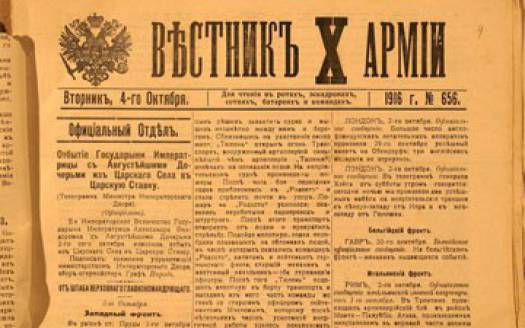
As in the USSR in 1941-1945, the army newspapers were published in the tsarist army during the First World War.
By the way, both the Russian and the Soviet government - yes, yes, this method was used with success, and it did the same thing, starting from paying articles written by "their" foreign journalists, and organizing special trips around the USSR known for their progressive views of writers from Europe and the USA. Moreover, it is clear that they showed only what the authorities wanted to show them.
That is, the effectiveness of monetary incentives for journalists was well known in Russia long before Alexander II, and he should have known about it! That is, he should only have given the command to journalists to start writing in their newspapers about the upcoming reform, so that everyone waited like manna from heaven. And all their aspirations, hopes and thoughts were associated with his name, Tsar-Batyushka! But ... nothing was done. It seems to be an intelligent and enlightened king, but he did his will in the silence of the office, contenting himself with spreading rumors, and did not use the press to support the reform in his mind completely! Alas, did not understand, apparently, the meaning of the printed word. And I did not see in Russia what the Frenchman de Barant saw ... that people, even cab drivers, are already reading!
Although, how did not understand? Write so, then write a lie! He should have understood! The fact is that it was in Russia that in 1847, a special magazine for soldiers began to be published, which was called “Reading for Soldiers”, which was published in such a way as to educate and educate them! Officers were required to read it to soldiers (they, by the way, were taught in the army to read and write!), And judging by the content, he was devoted not only to their military profession, but also told about carpentry and carpentry, how to become a tanner and cheesemaker, that is, this magazine was preparing soldiers for future peaceful life!
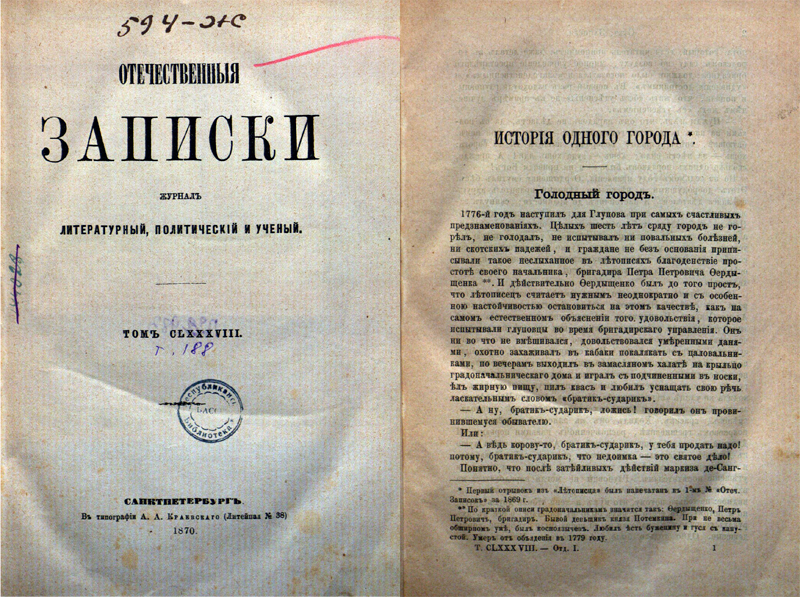
Interestingly, magazines in pre-revolutionary Russia were ... more popular than newspapers. The latter were seen as a source of gossip and News. One could think about the contents of the magazines! True, not everyone had enough money for them, but the intelligentsia, of course, read all the most popular magazines.
We will tell you more about this journal and similar editions in the Russian imperial army, however, it is clear that the government of the Russian Empire did not neglect the impact of the words. And only in the case of the abolition of serfdom, the provincial press in his hands for some reason did not use it at all. Well, about what it turned out for him, we will tell the next time ...
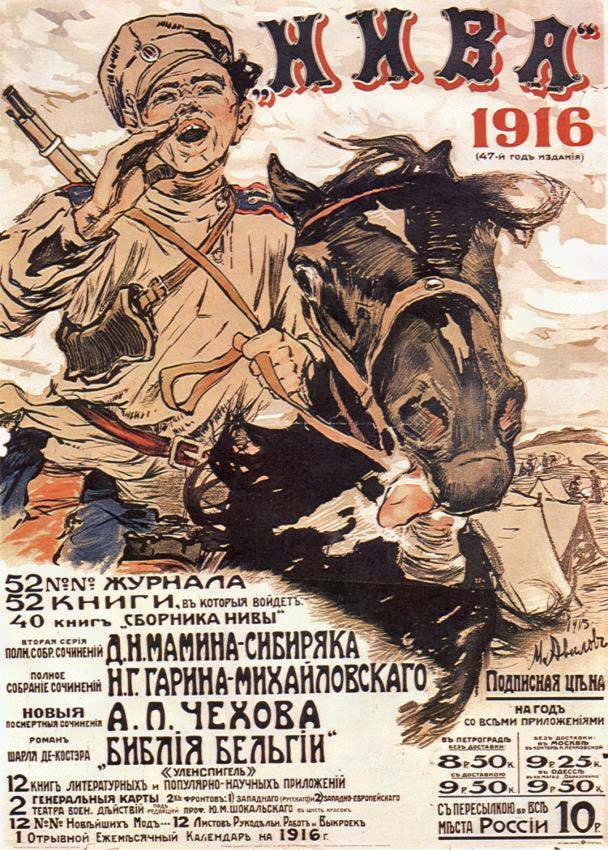
Look - war – war, but how many and what books have Russians been offered to subscribe to ?! The country was “reading” even then, with more than 70% illiterate among the population.
Продолжение следует ...
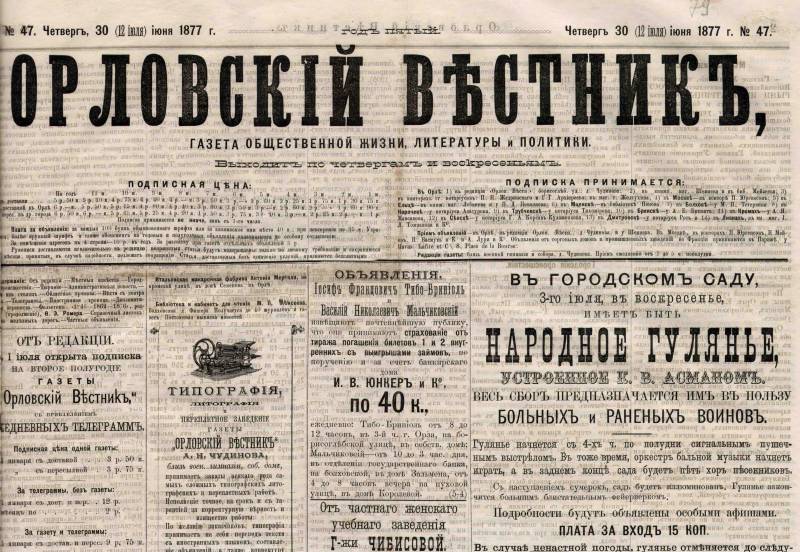
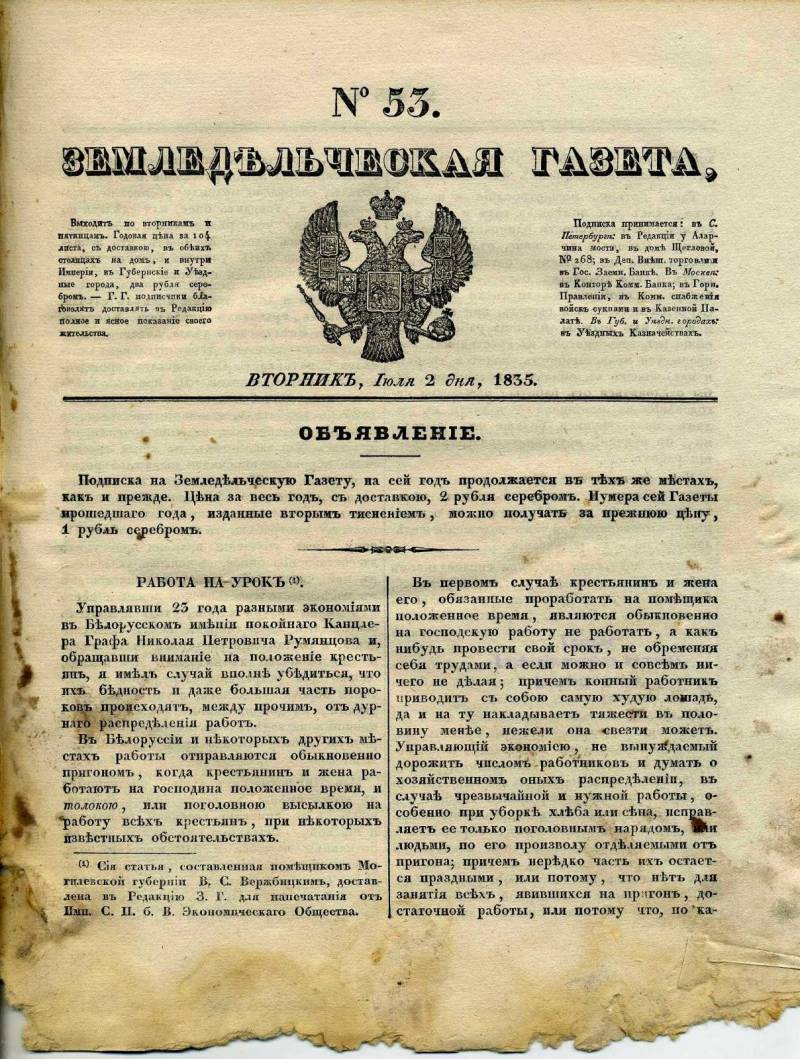
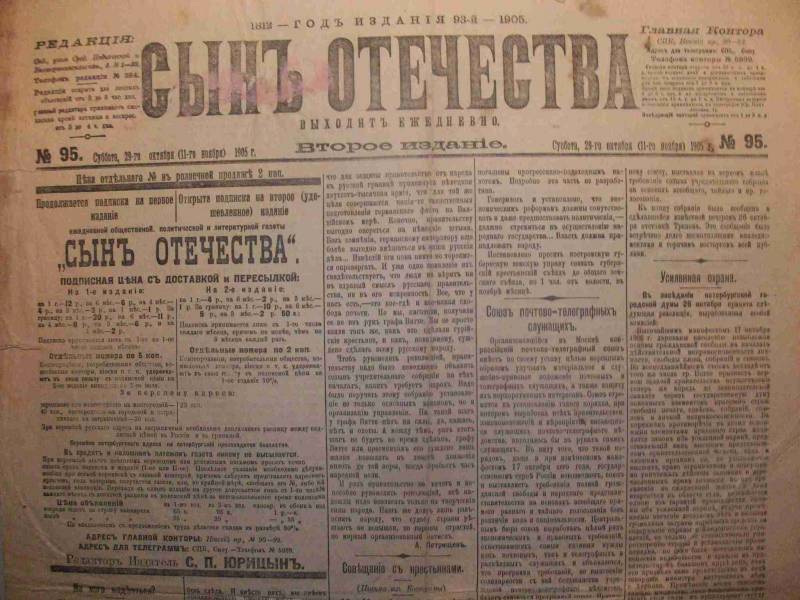
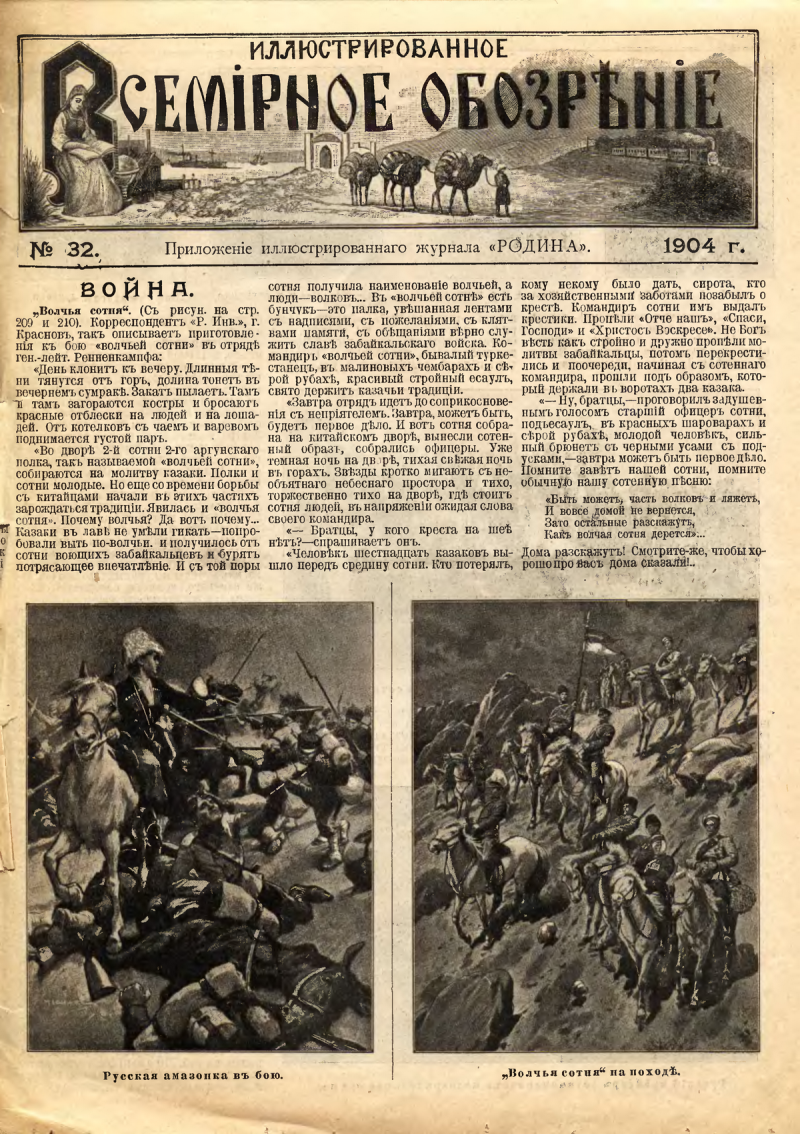
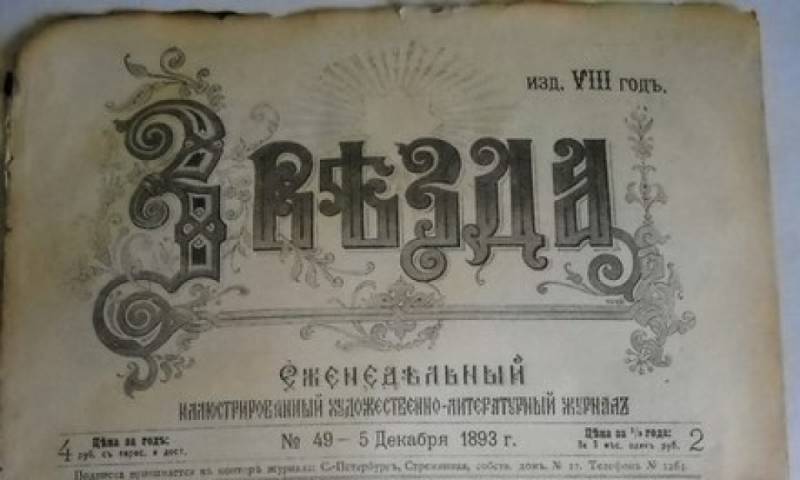
Information